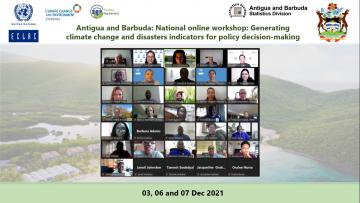Context
The availability of quality statistics and indicators is crucial to effectively respond to the effects of climate change and build resilience. In this regard, Antigua and Barbuda has put in place a National Environmental Data and Information System (NEIS)[1] and it strives to improve the collection of environmental data. However, like other Caribbean SIDS, Antigua and Barbuda faces statistical and institutional challenges. Decision-making suffers from poor data analysis and decentralization of environment data production renders difficult coordination among various data producers leading to an underuse of existing data and duplication of efforts [2].
Objectives
- Train the participants to build selected environment, climate change and disaster indicators and their metadata.
- Identify data and capacity gaps to build an information platform on resilience for the country.
- Have a better understanding of how geospatial data can enhance the use of environment, climate change and disaster indicators for effective decision making.
Expected outcomes
- At least four prioritized climate change or disasters indicator and their metadata are available at the end of the workshop.
- A list of relevant and prioritized climate change and disaster indicators for Antigua and Barbuda that are also linked to the Paris Agreement and the Global Set on Climate Change Indicators and Statistics of the UNSD.
- Follow-up steps to build further selected climate change and disaster indicators are agreed upon with the CSO and key stakeholders.
Workshop materials and further information are available at the following link: https://www.cepal.org/en/events/antigua-and-barbuda-national-workshop-g…;
[1] https://neis.environment.gov.ag/
[2] https://www.environment.gov.ag/assets/uploads/attachments/e4720-cccd-project-brief_.pdf
Programa
